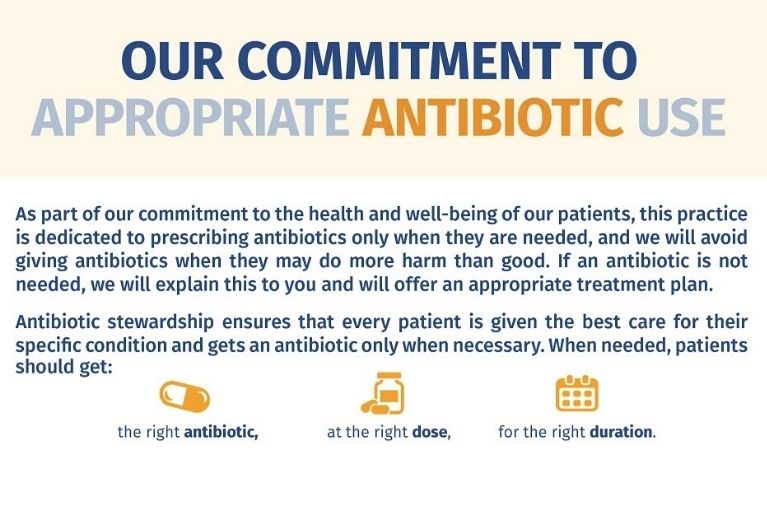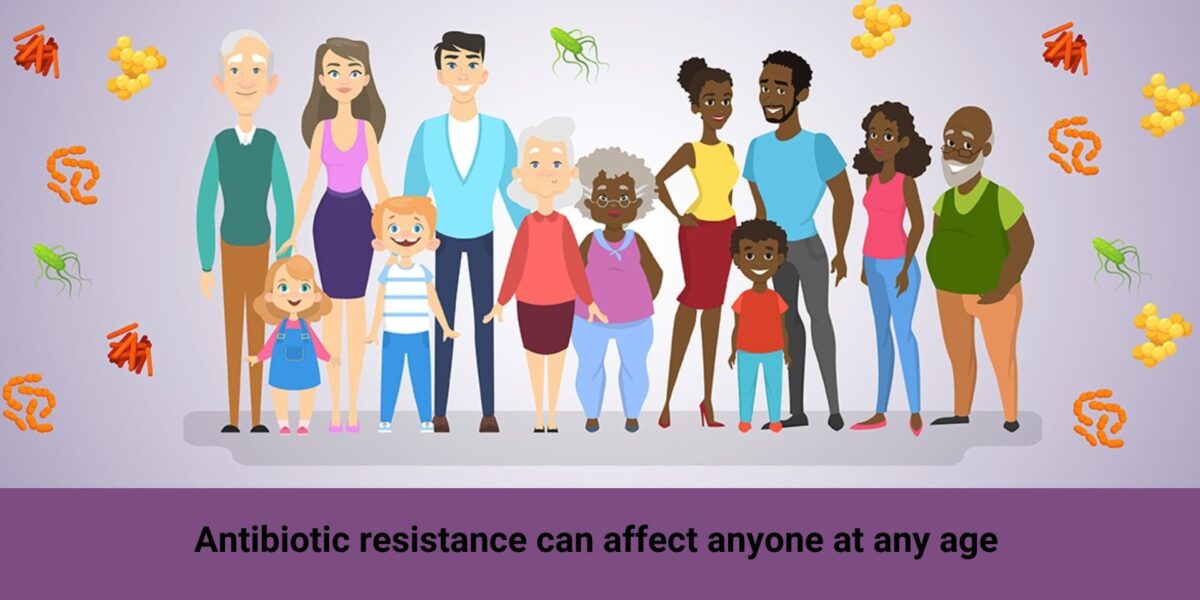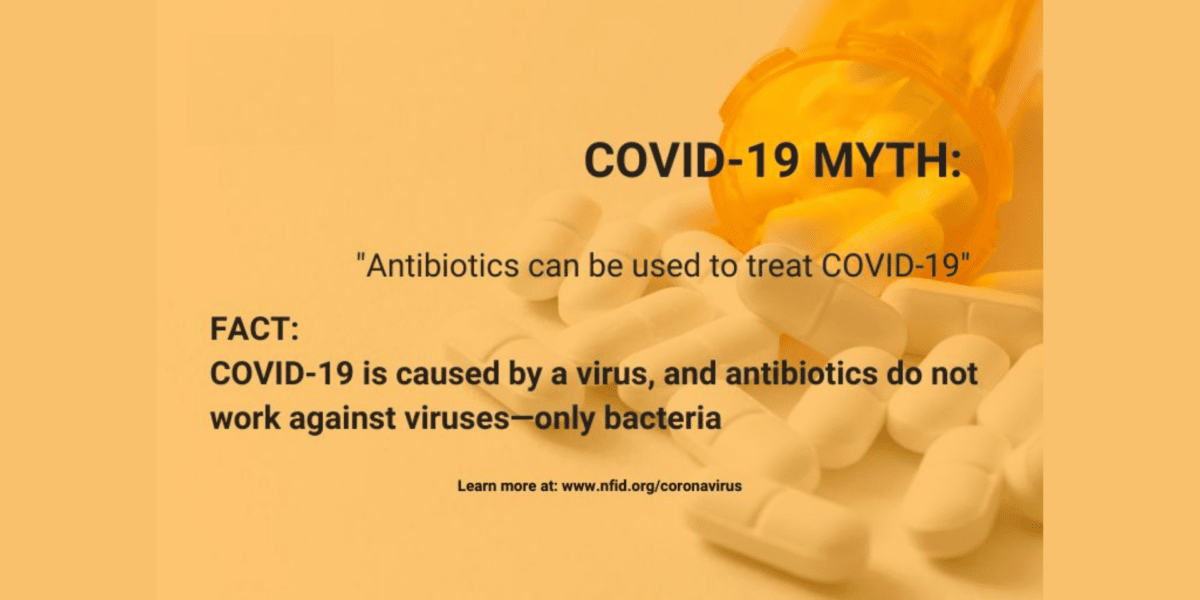Antibiotics can save lives and are important tools for treating common and serious bacterial infections. But it is important to use antibiotics only when needed and only as prescribed. Antibiotics are not effective against viral infections like colds, influenza (flu), most sore throats, bronchitis, and many sinus and ear infections. Widespread use of antibiotics for these illnesses can promote the spread of antibiotic resistance.
Antibiotic Resistance
Antibiotic resistance occurs when bacteria develop defenses against the antibiotics designed to kill them. Once resistance develops to one antibiotic, different antibiotics, which can be less effective or have more side effects, are needed for treatment. Sometimes bacteria can become resistant to all available antibiotics, leaving patients with infections caused by these bacteria with no options for therapy. Further, resistant bacteria can be spread to other people either in the healthcare setting or at home.
Antibiotic stewardship refers to approaches to improve how antibiotics are used to maximize cure and minimize antibiotic resistance and side effects. Both healthcare professionals and patients should ensure that antibiotics are prescribed only when they are needed. NFID is committed to raising awareness and educating healthcare professionals about antibiotic-resistant organisms and their impact on public health, as well as the implementation of antibiotic stewardship programs including guidelines for prescribing antibiotics, systems to track the use of antibiotics, and protocols for proper hand hygiene, sanitation, and overall infection prevention.
What Causes Antibiotic Resistance?
Antibiotic resistance can develop anytime antibiotics are used, even when they are prescribed and used appropriately. In fact, antibiotic resistance can occur naturally as microbes evolve. The misuse and overuse of antibiotics can contribute to the problem of antibiotic resistance.
Any time antibiotics are used, they can contribute to the development of antimicrobial resistance. The human body is full of bacteria, so when you take an antibiotic there is a good chance that the “good” bacteria in your gut will become more resistant to that antibiotic. Some people will not have consequences from this, but others may develop subsequent resistant infections or pass resistant bugs on to family members.
Burden of Antibiotic Resistance
Antibiotics have made many other medical advances possible, including transplants and cancer treatments. As antibiotics lose their effectiveness, we lose the ability to treat many diseases and perform routine surgeries.
More than 1 out of 4 antibiotics prescribed in US outpatient settings are unnecessary. According to the US Centers for Disease Control and Prevention (CDC), antibiotic resistance threatens everyone.
- Each year in the US, more than 2.8 million infections occur from antibiotic-resistant bacteria, and more than 35,000 people die as a result
- When Clostridioides difficile (C. diff) is included, the number jumps to 48,000 US deaths each year
- Antibiotic resistance adds $20 billion in excess direct healthcare costs each year in the US. Additional costs to society for lost productivity could be as high as $35 billion a year
Antibiotic resistance can be costly and devastating for patients and families. Antibiotic-resistant infections can lead to extended hospital stays, additional follow-up medical visits, and the use of treatments that may be costly and potentially toxic.
How to Prevent Antibiotic Resistance
There are many ways to help prevent resistance and protect individuals and their families:
- Wash Your Hands and Practice Healthy Hygiene: We are regularly exposed to millions of germs. Proper handwashing can help fight germs and prevent illness. It is also important to cover coughs and sneezes with a tissue or your elbow (not your hand).
- Know the Symptoms: Learn how to recognize early symptoms of an infection. Talk with a healthcare professional if you think you have an infection, or if your infection is not getting better or is getting worse.
- Ask Questions: Talk with a healthcare professional about why antibiotics are being prescribed, possible side effects, and how long you will need to take them.
- Learn the Right Ways to Use Antibiotics: Antibiotics are not effective against all infections. Make sure you are getting the right antibiotic, at the right dose, for the right amount of time. Never demand antibiotics if a healthcare professional says they are unnecessary.
- Never Share or Use Leftover Antibiotics: Take antibiotics exactly as prescribed and do not stop early or share unused prescription medications.
- Prepare Food Safely: Food such as meat, fruits, and vegetables can be contaminated with bacteria. The Centers for Disease Control and Prevention (CDC) recommends 4 simple steps to prepare food safely at home—clean, separate, cook, and chill.
- Get Vaccinated: Staying up to date on all recommended vaccines, can help prevent illness.
- Stay Healthy When Traveling Abroad: Know what vaccinations are needed, check health alerts, stick to safe food and drinks, and plan in advance in case you do get sick.
- Prevent Sexually Transmitted Infections (STIs): Lower your risk by choosing safer sexual activities and using condoms to help avoid infections such as gonorrhea that may be resistant to the drugs designed to treat them.
How Healthcare Professionals Can Help Prevent Antibiotic Resistance
Healthcare professionals can take steps to help protect patients from drug-resistant infections:
- Prescribe Antibiotics Carefully: Stay up to date on recommended antibiotic practices and doses. Prescribe antibiotics only when needed, for the shortest amount of time required. CDC has developed resources for healthcare professionals.
- Educate Patients: Tell patients about the side effects and risks associated with the antibiotics they are taking. Inform patients about antibiotic resistance and the dangers of misuse.
- Use Proper Hand Hygiene: Hand hygiene is important before and after patient care.
- Get Vaccinated: Vaccines help keep you healthy and ensure that you do not transmit harmful pathogens to your patients.
- Take the Antibiotic Stewardship Pledge: NFID and other public health organizations are working to improve how antibiotics are prescribed by healthcare professionals and used by patients.
Take the NFID Antibiotic Stewardship Pledge and download to display in your office to show your commitment to reducing antibiotic resistance through appropriate antibiotic use.
Updated November 2024
Source: Centers for Disease Control and Prevention
Related Posts
C. diff: An Urgent Public Health Threat
November is C. diff Awareness Month, an annual opportunity to raise awareness about this common but potentially deadly infection







